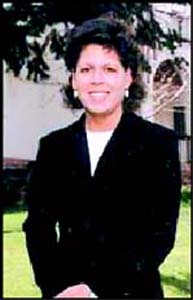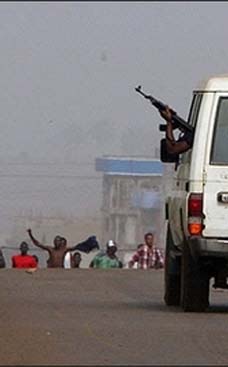
For the time being, Babby is finding it challenging to share her American Indian culture with a new community. "Most people initially think I'm Italian," she said, but then they are fascinated to learn more about the history of her people. The task of educating the Romanians is sometimes daunting when they believe that everything Babby does is characteristic of American Indians. She is observed like a museum exhibit, and her daily routine becomes a reflection of her Indian upbringing that neglects all American influence. Since itís part of her day, those who meet Babby "assume that all American Indians like to run and eat a lot of vegetables." Without avoiding her culture, Babby teaches her community that Americans (minorities included) are integrated and embrace cultural factions. By living two years among her Romanian community in Vatra Dornei, she has incorporated herself in the way of life and customs of the people she meets.
To some who knew her as an Oglala Sioux Tribe member and American Indian advocate, Lorna Babby's decision to serve in the Peace Corps in Romania seemed almost like abandonment
American Indian Strives to Promote Peace in Romania
In recognition of American Indian Heritage Month, this is the latest feature on a Volunteer making a difference
11/22/2006
WASHINGTON, D.C., November 20, 2006 Ė Lorna Babby cautioned others who share her background: "Be prepared to be asked why you are volunteering overseas when so much work remains to be done on reservations." To some who knew her as an Oglala Sioux Tribe member and American Indian advocate, her decision to join the Peace Corps seemed almost like abandonment. For ten years, Babby, 41, practiced American Indian affairs law to aid causes on her home soil. "I needed a break," said the Yale Law School graduate, "an opportunity to put things in my life back into perspective."
Traveling to the Carpathian Mountains of Romania, Babby found that perspective. She works for the newly established National Park known for its unique geological features and carnivorous dwellers, including bears and wolves. Like her tireless efforts for her tribe, Babby tries to improve the economy of the local communities surrounding the park.
Babby's efforts as a Peace Corps Volunteer mirror her life's goals. She is building a multi-purpose trail that will navigate the wild mountains and, hopefully, bring tourists to boost the economy. In turn, she is creating a trail of her own and making a connector from her previous life to her new one, in which she will have the Peace Corps experience as a backbone for future challenges.
For the time being, Babby is finding it challenging to share her American Indian culture with a new community. "Most people initially think I'm Italian," she said, but then they are fascinated to learn more about the history of her people.
The task of educating the Romanians is sometimes daunting when they believe that everything Babby does is characteristic of American Indians. She is observed like a museum exhibit, and her daily routine becomes a reflection of her Indian upbringing that neglects all American influence. Since itís part of her day, those who meet Babby "assume that all American Indians like to run and eat a lot of vegetables."
Without avoiding her culture, Babby teaches her community that Americans (minorities included) are integrated and embrace cultural factions. By living two years among her Romanian community in Vatra Dornei, she has incorporated herself in the way of life and customs of the people she meets.
Babby's most memorable experiences revolve around public transportation. She describes the hot, crowded trains as gathering places to share food and stories. "Many people board the train with enough provisions to last a week, which they invariably share with everyone in their compartment," she said. Homemade plum brandy and fresh bread are in abundance, as well as the generosity, which is "a way of life in Romania."
That generosity is reflected in Babby's work as an environmental management and education Volunteer. To engage the teenagers, to whom she teaches environmental issues, she plays Jeopardy with them, "which the kids love," she said. And in her tireless efforts to promote the national park, Babby helps out with park visitors from English and German speaking countries or spends days clearing the trail so others can enjoy it to the fullest.
She is so effective in part because she can relate to Romanians, whose problems with economic development and other social issues arising from poverty often mimic those in her own reservation community. Her status as an American Indian Volunteer can bridge the gap between cultures that exist thousands of miles apart.
"I think it is extremely important for the Peace Corps to reflect our multicultural society," Babby said. She encourages other minorities to volunteer for the opportunity to gain relevant work experience and skills, if not just for the chance to go through a life-changing experience. She is also keen to note that Peace Corps offers "student loan-related advantages as well."
So, what about all those nay-sayers who question Babby's decision to join Peace Corps? "The answer I give," she said, "is that the experience, knowledge, confidence, and perspective I am gaining as a Peace Corps Volunteer will make me a more effective Indian advocate when I return home."
In 1991, Volunteers began addressing Romania's expressed concern over the lack of English language instructors and business educators, who are needed to teach local youth the skills they need to succeed in a changing work environment. Since then, government has also requested Volunteers provide guidance to the newly emerging social and environmental non-governmental organizations. Over 750 Peace Corps Volunteers have worked in the areas of small business and micro-enterprise development, secondary education, social work, NGO development, and environmental management and education. Currently, 136 Volunteers serve in Romania. To learn more about Romania, please visit the Where Do Volunteers Go? section.
The Peace Corps is celebrating a 45-year legacy of service at home and abroad, and a 30-year high for Volunteers in the field. Since 1961, more than 182,000 Volunteers have helped promote a better understanding between Americans and the people of the 138 countries where Volunteers have served. Peace Corps Volunteers must be U.S. citizens and at least 18 years of age. Peace Corps service is a 27-month commitment.
















